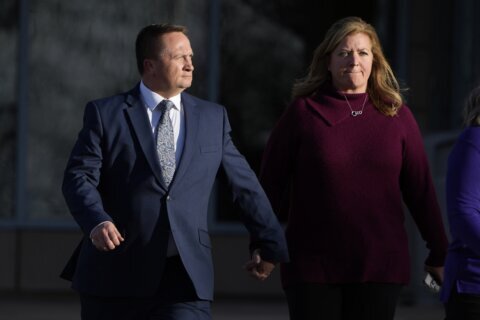A Texas appeals court has overturned a Fort Worth woman’s voter fraud conviction and five-year prison term for casting an illegal provisional ballot.
Crystal Mason did not know that being on probation for a previous felony conviction left her ineligible to vote in 2016, the Second District Court of Appeals in Fort Worth ruled on Thursday.
Appearing near tears at times, Mason said during a Friday news conference that it has been a long seven years since the voting charge. “I’ve been out for six years on an appeal bond, one foot in one foot out, not knowing if I was going back to prison,” Mason said.
“When I got the news … I was just overwhelmed in joy, it’s been a long journey,” Mason said. “I cried and hollered when I got the news.”
Prosecutors maintained that Mason read and signed an affidavit accompanying the provisional ballot affirming that she had “fully completed” her sentence if convicted of a felony.
Justice Wade Birdwell wrote that having read these words on the affidavit didn’t prove Mason knowingly cast the provisional ballot illegally.
“Even if she had read them, they are not sufficient … to prove beyond a reasonable doubt that she actually knew that being on supervised release after having served her entire federal sentence of incarceration made her ineligible to vote by casting a provisional ballot,” the decision said.
Thomas Buser-Clancy, an attorney for the American Civil Liberties Union of Texas, called the ruling “a victory for democracy.”
“Mrs. Mason never should have been prosecuted for what was at worst an innocent misunderstanding,” said Buser-Clancy. He noted that the ballot wasn’t counted because she was not a registered voter, and said the case should have ended there.
Mason, a former tax preparer, had been convicted in 2012 on charges related to inflating refunds for clients and served nearly three years of a five-year sentence in prison. Then she was placed on a three-year term of supervised release and had to pay $4.2 million in restitution, according to court documents.
Because of the initial conviction, Mason was returned to federal prison for 10 months to complete the original sentence and given two more years of supervised probation.
The Texas Court of Criminal Appeals previously ordered the court to review whether there was sufficient evidence to convict Mason, ruling that Texas election law requires that individuals know they are ineligible to vote to be convicted of illegal voting.
Buser-Clancy said the state could ask the Court of Criminal Appeals to review the case, but hopes prosecutors will accept the ruling.
Prosecutors did not immediately return a phone call for comment Friday.
Kim Cole, an attorney for Mason, called the prosecution malicious and politically motivated.
“The state’s prosecution specifically stated that they wanted to ‘send a message’ to voters. They deliberately put Crystal through over six years of pure hell,” Cole said in the statement.
Mason’s long sentence made both state Republican and Democratic lawmakers uneasy. In 2021, after passing a new voting law measure over Democrats’ objections, the GOP-controlled state House approved a resolution stating that “a person should not be criminally incarcerated for making an innocent mistake.”
Critics of the state’s voting laws contend that Texas has targeted Black and Latino voters who have tended to vote for Democrats so that Republicans can stay in power.
The Sentencing Project, which advocates for reducing punishment and expanding voting rights of felons nationwide, says Texas leads the nation by disenfranchising 450,000 citizens, or 2.5% of the state’s voting age population, about two-thirds of them Black or Latino.
Texas Legislative Black Caucus Chairman Rep. Ron Reynolds said Mason’s case shows the systemic challenges marginalized voters face as they try to cast ballots.
“While her vindication is a step in the right direction, it highlights the urgent need for comprehensive electoral reform to ensure equitable access to the ballot box for all citizens,” Reynolds’ statement said.
Texas is among dozens of states that prevent felons from voting even after they leave prison, while in 22 other states, felons can vote as soon as they’re out of prison, and two states — Vermont and Maine — allow felons to vote while still incarcerated, according to the ACLU.
Attorney Alison Grinter Allen said she doesn’t know how many Texas citizens are ineligible because they are on parole or still owing fines, but she said the state’s laws confuse people.
“A great number of people on probation in Texas are on pre-conviction probation, and those folks are all eligible to vote, “Allen said. “So a lot of people are swept into believing they can’t vote because they’re on a kind of probation that is not disqualifying.”
Copyright © 2024 The Associated Press. All rights reserved. This material may not be published, broadcast, written or redistributed.







